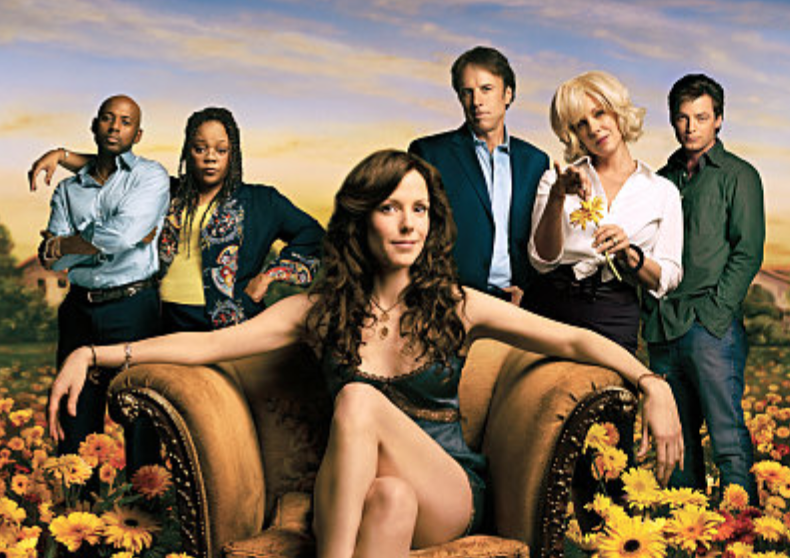How 'Weeds' Proved that Comedies Don’t Have to Be Laugh Out Loud Funny

Casey Duby ’21 / Emertainment Monthly Staff Writer
Weeds, which aired from 2005 to 2012 on Showtime, resembled a typical drama more than a comedy in many ways. Episodes, especially in the later seasons, began with a recap of the previous episode to make sure the audience was up to speed. Most comedies don’t do this, and if they do it’s on a rare occasion like a season opener or a special two-part episode. This is simply because, most of the time, they don’t need to. In many comedies, the events that happen in each episode exist in a vacuum – their consequences don’t carry over into the next episode. Even in comedies that do have season-long arcs, the specific details of the last episode rarely directly affect the next one. Comedies are made to be low commitment. You watch when you can, and even if you’re inconsistent, you’ll still be entertained. Weeds does not operate this way. A lot transpired in each episode, and everything the Botwins faced in one episode would certainly have significant consequences later on. If you picked an episode at random, the characters could be living in a different town, facing different problems, and even using different names than they were four episodes ago. And yet, this show endured eight full seasons despite its high demands for a comedy audience. People were willing to commit because they needed to know how Nancy (Mary-Louise Parker) was going to get her next supply of weed.
The humor is also much darker and more subdued than most comedies. While some shows, like It’s Always Sunny in Philadelphia and Arrested Development, are known for their dark wit, the humor in Weeds is almost used to acknowledge the fact that this show is taking itself more seriously than most. This show was about a suburban mother selling marijuana to get some extra cash; how did she end up married to a Mexican drug kingpin fleeing the country after her fifteen-year-old son committed murder? The characters have no idea, but they’re just as aware as we are of how ridiculous that is. Their acknowledgment of the intensity of their situation allows the audience to, instead of getting frustrated with how much things have escalated, simply enjoy the ridiculousness of the drama. The show is able to take each situation to a level beyond that of what drama audiences might accept because the characters make light of things. A moment where the show did this well was when Celia (Elizabeth Perkins) was kidnapped by her own daughter in another country and held for ransom. Her daughter’s boyfriend went through Celia’s entire contact list in her phone, and not a single person he called cared about her enough to remotely consider paying the ransom. The other character’s flippancy when someone they knew had been kidnapped was funny and allowed the situation, which would seem extreme and melodramatic if it were to be taken completely seriously, to be light and comical.
Weeds used humor just enough that the show was able to go in the direction it needed to go. The Botwins had to keep getting deeper and deeper into trouble, or else there’s no show. But beyond allowing this to happen, there are very few jokes in the show just for the sake of being funny, and very few moments that I would describe as laugh out loud hilarious. The show is raw and emotional more often than it is funny, though there are many episodes where the audience isn’t asked to laugh or cry at all. Weeds found the balance between comedy and drama; it was able to ask the audience to simply take everything in as it unfolded without taking it too seriously or not seriously enough. And its long run and overall success proved that comedy audiences can handle heavier content that demanded more of their attention. They can even handle a comedy that isn’t all that funny.
In fact, the only thing about Weeds that is most like a traditional comedy is its half-hour format. The fact that it was able to fit so much plot and character development into that time frame is impressive in itself. A tidbit that makes Weeds’ unusual structure even more noteworthy is that Jenji Kohan, the creator of Weeds also created Orange is the New Black, which has been in the comedy category for every Emmy nomination it’s received. OITNB, while it certainly has its funny moments, is much more emotionally taxing to watch than it is laughable, and each episode is an hour-long commitment (some even longer). The questionable lines between comedy and drama in these shows prove that the boundaries of the genres can be stretched, and even broken, with great success. It also begs the question of whether it’s time to start changing the way we view genre in television.